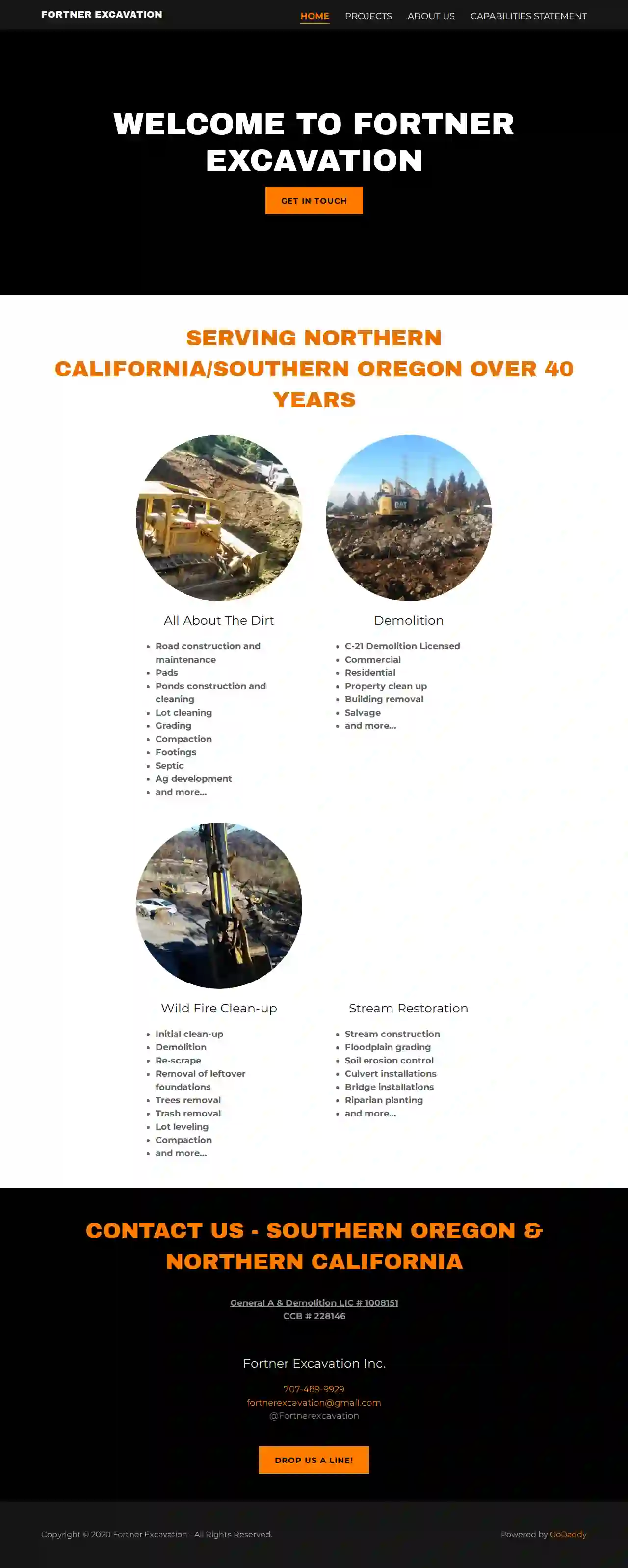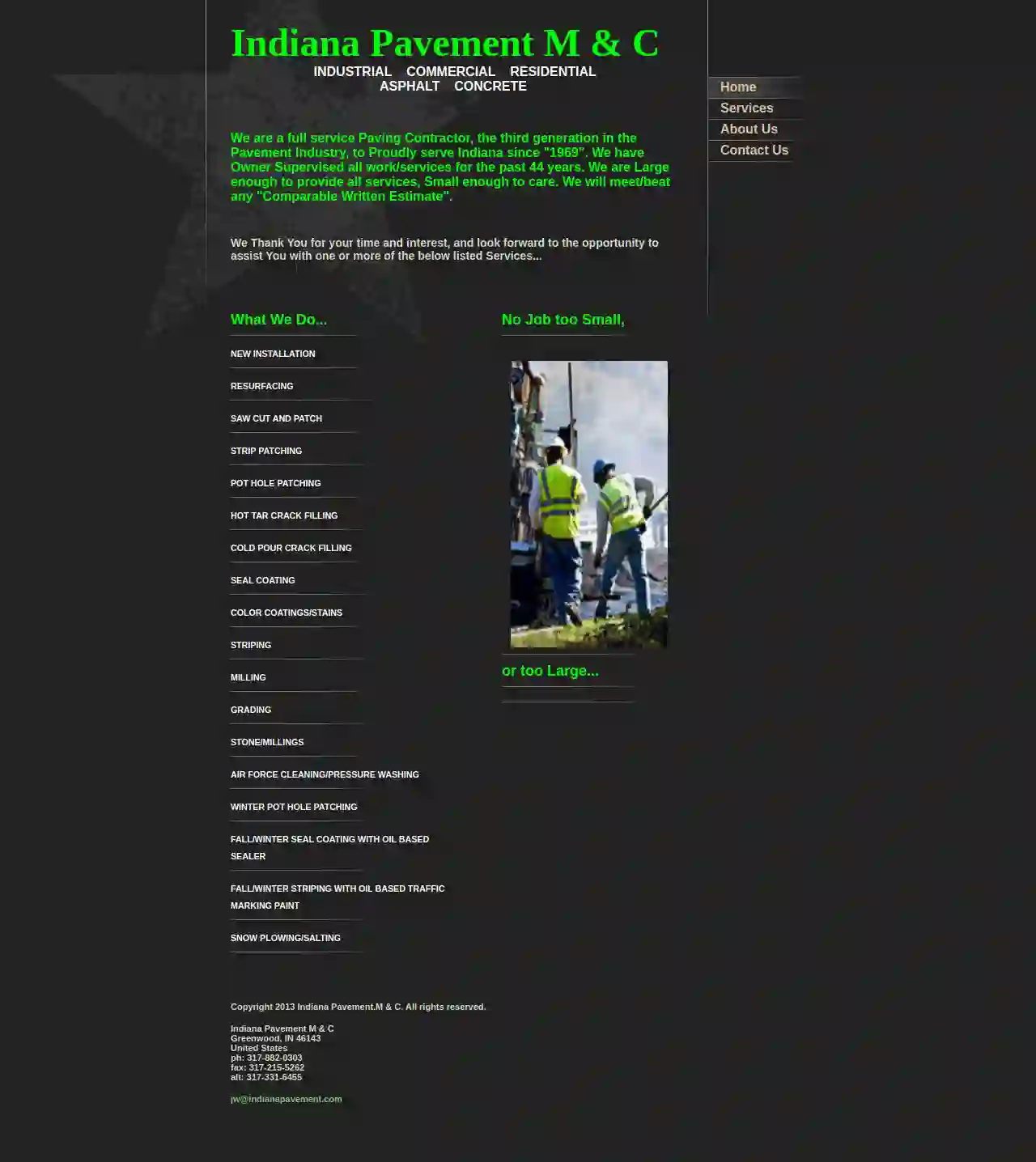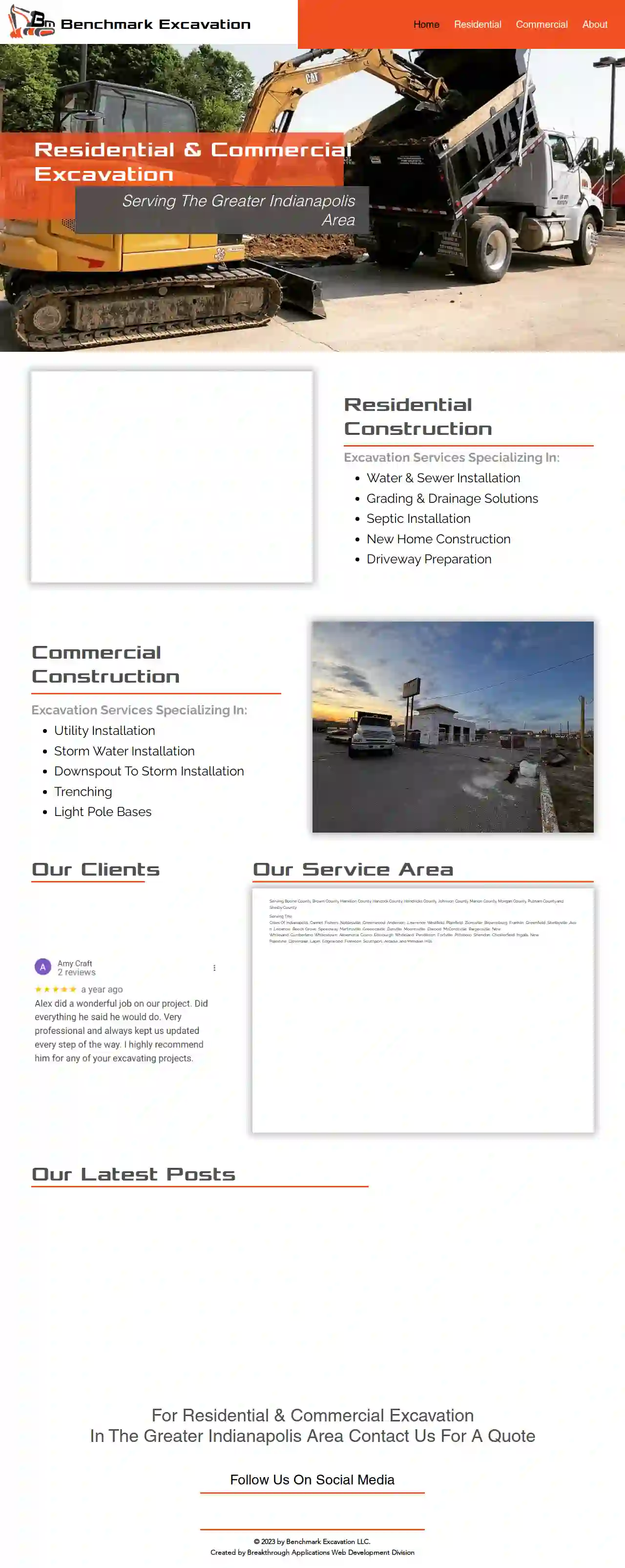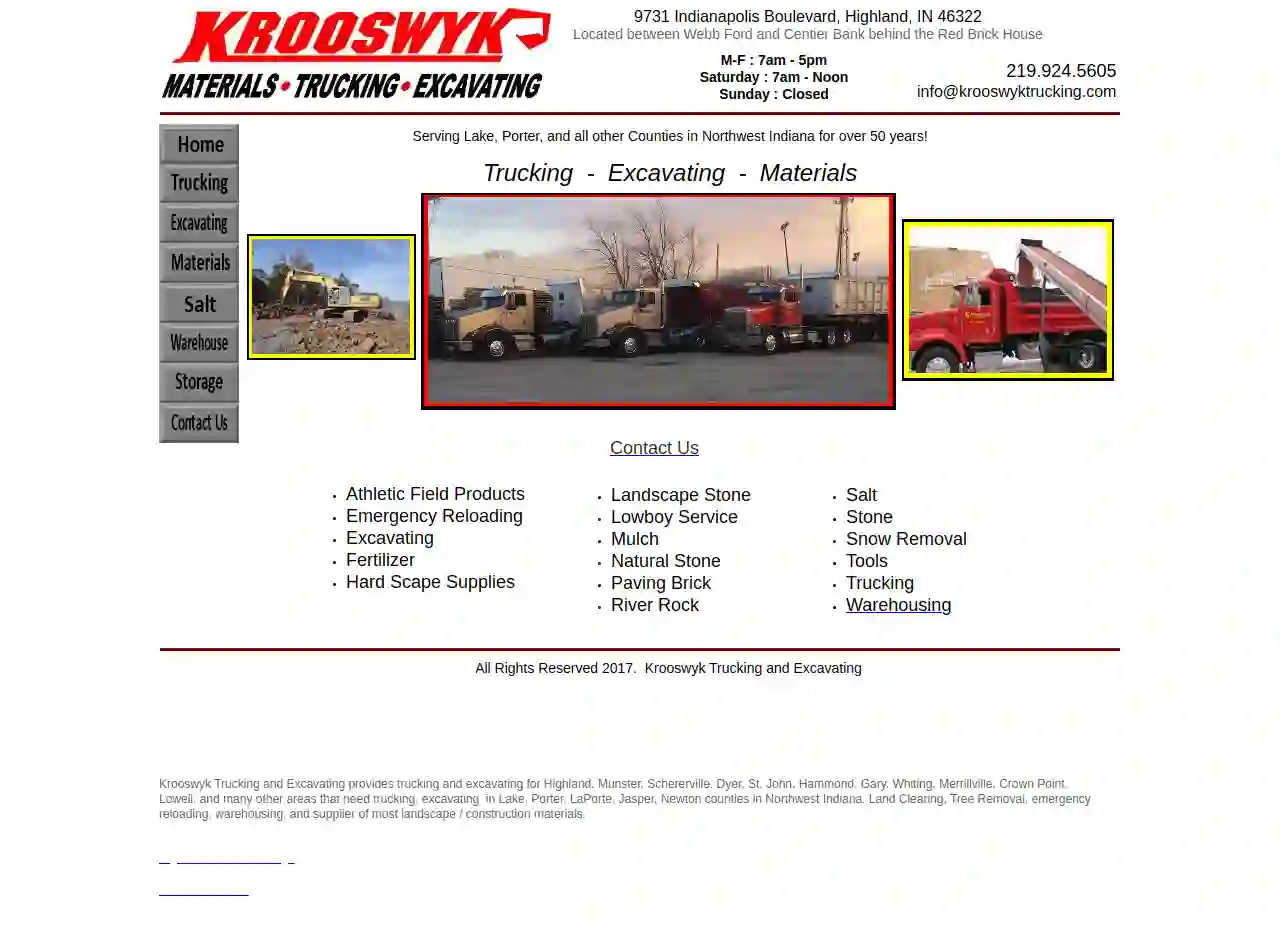Excavation Contractors Vincennes
Find Land Excavation in Vincennes
Get 3 FREE Excavating Contractors quotes for your project today! Compare profiles, reviews, accreditations, portfolio, etc... and choose the best offer.

Fortner Excavation, Inc.
Chico, USAbout Us Bobby and Delaine Fortner started with 1 Backhoe and a beat up old Dump truck in December of 1979. They had a $300 payment on that backhoe and sweated every month to pay that payment. They loved it though. They wanted to be independent, self employed business owners. Since that time they have grown a little each year. Now in 2020, along with their 2 sons, they are continually making this business grow and evolve. Travis and Jeff are owners and Shareholders. We Are Expanding We are now located in the Medford and Southern Oregon area. Jeff Fortner is our “Go To Guy” for all the Jobs in that area. He is constantly working towards keeping the company running smoothly. Travis Fortner has a Tree Hedging company in addition to excavation at the Chico location and is still involved and bringing us lots of work and helping out on the side lines. Family Owned, Locally Grown We are 2nd and 3rd generation to Northern California. And we have expanded to Southern Oregon. We live and work here so we care about our customers and our quality of workmanship on every job. We are licensed to do excavation and demolition.
- Services
- Why Us?
- Our Team
- Gallery
Get Quote
Indiana pavement M & C
4.325 reviewsGreenwood, 46143, USIndiana Pavement M & C: Your Trusted Paving Partner Indiana Pavement M & C is a family-owned and operated paving contractor with a rich history spanning three generations. Since 1969, we've been serving Indiana with pride, providing top-notch paving solutions for residential, commercial, and industrial clients. Our commitment to quality and customer satisfaction has earned us a reputation as a reliable and trustworthy partner in the pavement industry. We take pride in our owner-supervised approach, ensuring every project is completed to the highest standards. Our team is large enough to handle any project, yet small enough to provide personalized attention and care. We believe in transparency and offer competitive pricing, always striving to meet or beat any comparable written estimate. We are dedicated to providing a wide range of services to meet your specific needs. From new installations to repairs and maintenance, we have the expertise and experience to handle it all. We are committed to delivering exceptional results that enhance the beauty and functionality of your property. We understand the importance of protecting your investment. Our services, such as crack filling and seal coating, are designed to preserve your pavement and prevent costly repairs down the line. We are confident that our work will exceed your expectations and leave you with a lasting impression. Contact us today for a free consultation and estimate. We look forward to partnering with you on your next paving project.
- Services
- Why Us?
- Gallery
Get Quote
Indy Excavating & Utilities
3.76 reviews3512 S Harding St, Indianapolis, 46217, USAbout Indy Excavating & Utilities LLC At IEU, we strive for excellence in every project we undertake. With precision and expertise, we ensure that each task is executed meticulously, prioritizing safety as the cornerstone of our operations. Our unwavering dedication to integrity is the driving force behind our success, reflecting our promise to deliver superior services that stand the test of time in the great city of Indianapolis. We live and work by a simple creed: “Done Right. Done Safe. Done With Integrity.” We take pride in forming meaningful partnerships with both industry and community leaders, and forging connections that are bigger than the scope of our projects. Through these partnerships, we leave a legacy of service that extends beyond the earth we move.
- Services
- Why Us?
- Gallery
Get Quote
Fehling Excavating and Land Clearing LLC
515 reviews14504 Wingate Rd, Moores Hill, 47032, USABOUT Fehling Excavating LLC is a family owned and operated company. We have built this company from the ground up and take the utmost pride in all our work. You can count on myself or my father Bill Fehling to be on every job site to ensure the work is done right. When you call, you will speak directly to either one of us and we will promptly provide you with the information you will need to get your project done in the timeframe in which you are looking to do it. We are a relationship-based company and thrive for customer satisfaction. No project is too big or too small. Every project receives the personal attention it deserves, from the planning phrase to completion. As experts in our fields, we believe in customer education as a top priority and, therefore, always strive to maintain a high level of communication throughout the process.
- Services
- Why Us?
- Testimonials
- Gallery
Get Quote
Benchmark Excavation LLC
517 reviewsIndianapolis, USBenchmark Excavation Serving Boone County, Brown County, Hamilton County, Hancock County, Hendricks County, Johnson County, Marion County, Morgan County, Putnam County, and Shelby County. Serving The Cities Of Indianapolis ,Carmel ,Fishers ,Noblesville ,Greenwood ,Anderson ,Lawrence ,Westfield ,Plainfield ,Zionsville ,Brownsburg ,Franklin ,Greenfield ,Shelbyville ,Avon ,Lebanon ,Beech Grove ,Speedway ,Martinsville ,Greencastle ,Danville ,Mooresville ,Elwood ,McCordsville ,Bargersville ,New Whiteland ,Cumberland ,Whitestown ,Alexandria ,Cicero ,Edinburgh ,Whiteland ,Pendleton ,Fortville ,Pittsboro ,Sheridan ,Chesterfield ,Ingalls ,New Palestine ,Cloverdale ,Lapel ,Edgewood ,Frankton ,Southport ,Arcadia ,and Meridian Hills. Our Clients Our Service Area Residential & Commercial Excavation Serving The Greater Indianapolis Area Contact Us Residential Construction Excavation Services Specializing In: Water & Sewer Installation Grading & Drainage Solutions Septic Installation New Home Construction Driveway Preparation Contact Us Today 1.310.703.4478 Commercial Construction Excavation Services Specializing In: Utility Installation Storm Water Installation Downspout To Storm Installation Trenching Light Pole Bases Contact Us Today 1.310.703.4478
- Services
- Why Us?
- Gallery
Get Quote
All Phase Excavating Inc
32 reviewsGary, USAbout All Phase Excavating "On time and on budget" is the goal of every excavation service company and at All Phase Excavation Service we add "done to perfection" to that tag line. When the carpenters show up to build the forms they'll find a site that is excavated to specifications, minimizing unnecessary work. We understand that a general contractor's primary concerns when selecting an excavation service include experience, capabilities, capacity, reliability, flexibility and of course a fair price. Excavation is typically the first task in starting a project and if that task is not performed to spec or is delayed it can have a serious impact on the success of the overall project. We understand the importance of being reliable and are prepared to perform the job as expected. The company started when founder and owner Vince Cheney launched All Phase Excavating in May of 1998 with a single bobcat and a pickup truck. He figured the way to be successful as a business owner is to do what you do best. "I really do enjoy excavating. I get a kick out of it and I decided that as I grew I would surround myself with other people who liked working excavation as much as I do." Serving Marin, Napa and Sonoma counties All Phase Excavating is headquartered in Penngrove with an equipment yard centrally located in Sonoma County. All Phase Excavating has grown from a single bobcat and a truck to 22 pieces of excavating and hauling equipment specifically acquired to tackle client needs. All Phase Excavating has the capability to tackle any excavating project large or small, from ground clearing to hauling debris. If It's an Excavating Challenge We Want a Shot at It As a general contractor you may not be overly concerned if your excavator is has a passion for moving earth but if you think about it, people who really enjoy their work are typically better at it than most. They see difficult jobs as a test of their skill and that's why we excel at tight access, hillside excavation, full and partial structure demolition and abatement and other demanding excavating projects. Vince is personally involved onsite in every project often working side by side with his crews. This onsite management involvement assures quality work and allows for streamlined communications with the general contractor. All Phase is a Responsible Community Business Is there a Californian that is not aware of the state's efforts to protect and improve our environment? At All Phase Excavation we are in full compliance with requirements with DPF requirements and our abatement service
- Services
- Why Us?
- Gallery
Get Quote
Krooswyk Trucking & Excavating
58 reviews9731 Indianapolis Boulevard, Highland, 46322, USAbout Krooswyk Trucking and Excavating Krooswyk Trucking and Excavating has been serving Northwest Indiana for over 50 years, providing reliable and efficient trucking and excavating services to a wide range of clients. We are committed to delivering exceptional service and exceeding expectations on every project. Our team of experienced professionals is dedicated to providing safe, timely, and cost-effective solutions for all your trucking and excavating needs. We are proud to serve the communities of Highland, Munster, Schererville, Dyer, St. John, Hammond, Gary, Whiting, Merrillville, Crown Point, Lowell, and many other areas in Lake, Porter, LaPorte, Jasper, and Newton counties. Our services include: Trucking: We offer a variety of trucking services, including dump truck, box trailer, flatbed, and lowboy hauling. We can handle a wide range of materials, including snow, salt, black dirt, topsoil, sand, gravel, stone, and more. Excavating: Our experienced operators and state-of-the-art equipment can handle any excavating project, from small residential jobs to large commercial projects. We offer services such as land clearing, tree removal, grading, and site preparation. Materials: We are a supplier of a wide range of landscape and construction materials, including athletic field products, fertilizer, hard scape supplies, landscape stone, mulch, natural stone, paving brick, river rock, salt, stone, tools, topsoil, and more. We are committed to providing our customers with the highest level of service and quality. We are licensed, insured, and ready to meet all your trucking and excavating needs. Contact us today for a free estimate!
- Services
- Why Us?
- Gallery
Get Quote
Valpo Excavation & Septic
1101 Cumberland Crossing Drive, Suite 223, 1101 Cumberland Crossing Drive Suite 223, Valparaiso, 46383, USValpo Excavation & Septic: Your Trusted Excavation Partner in Northwest Indiana At Valpo Excavation, we are dedicated to delivering exceptional service with every project. Our team boasts years of experience in professional excavation, grading, trenching, site preparation, septic installation & repairs, and a wide range of other services. We are equipped with the most reliable equipment and skilled professionals to handle any excavation, septic, and foundation needs. When you require groundwork in Northwest Indiana, we are your one-stop solution. We understand that site preparation is crucial for any construction project. We offer a comprehensive suite of services, from grading and trenching to foundation installation. Our team at Valpo Excavation & Septic has extensive experience in heavy construction and will execute your sitework with precision and efficiency. Valpo Excavation is a locally-owned and operated company founded by Russ Buechs, a man driven by the American Dream. Russ is a family-oriented businessman committed to providing a fulfilling life for his family. This dedication led him to establish this family-owned, faith-based company from the ground up. He built this company with honesty, trustworthiness, and integrity as core values. His mission is to provide solid foundations for every home and business throughout Northwest Indiana. From initial site preparation to the laying of foundations and utilities, Valpo Excavation can handle it all with expertise and reliability. For over 15 years, Russ has been a dedicated professional in heavy construction. He possesses experience in every stage of home building, from foundation work to gutter installation. Additionally, his multi-year mission work in Guatemala provided him with valuable experience in concrete pouring. Russ's diverse experience makes him highly knowledgeable and prepared to deliver exceptional results. At Valpo Excavation, we provide excavation services, sitework, clear cutting, trenching, land grading, flatwork, and foundation work for any home or business in Northwest Indiana. We collaborate with both contractors and individual homeowners or business owners. Whatever your excavation needs may be, we have the solution.
- Services
- Why Us?
- Gallery
Get Quote
Pat Mc Graw Excavating
Aurora, USAbout Us With over 20 years in business and hundreds of satisfied customers, Pat McGraw Excavating is your trusted partner for all your excavation needs. We service the Tri-State area with over 30 pieces of heavy equipment at our disposal, ensuring no project is too big for us.
- Services
- Why Us?
- Gallery
Get Quote
Brothers Excavating, LLC
51 reviewsIndianapolis, USAbout Brothers Excavating Brothers Excavating has the experience, the expertise, and the equipment to complete any size project from driveways to roads, drainage to erosion control, and yard grading to mass Excavation. Fully insured and bonded with more than 20 years in the business, Brothers Excavating is your on-time, on-target, and on-budget excavating contractor. We service a 75-mile radius, including: Indiana Terre Haute Indianapolis Lafayette Bloomington Vincennes Illinois Champaign Danville Effingham Mattoon Meet The Owner Don Bowers President – 30 years experience As a second-generation construction excavator, the desire to dig and build is in my bones. Couple that with an entrepreneurial spirit lead to the development of Brother’s Excavating with a goal to bring a professional and progressive approach to this industry with experience and the latest technology. Furthermore, I measure success by customer satisfaction throughout the entire building cycle rather than just the end result
- Services
- Why Us?
- Our Team
- Testimonials
- Gallery
Get Quote
Over 22,076+ Excavation Businesses on our platform
Our excavation pros operate in Vincennes and beyond!
ExcavationHQ has curated and vetted Top Excavation Businesses near Vincennes. Find the most reliable contractor today.
Frequently Asked Questions About Excavation Contractors
- Hauling to Designated Disposal Sites: Transporting excavated material to approved landfills or recycling centers.
- Recycling or Reuse: If suitable, some excavated soil might be recycled for other projects or reused on-site for landscaping or backfilling.
- Complying with Regulations: Adhering to local and environmental regulations for soil disposal to prevent contamination or illegal dumping.
- Planning and Surveying: Defining the excavation area, marking utility lines, and determining the required depth and grade.
- Site Preparation: Clearing vegetation, removing obstacles, and ensuring site accessibility.
- Excavation: Using appropriate equipment (excavators, backhoes, etc.) to remove earth and create the desired excavation.
- Hauling and Disposal: Transporting excavated material to designated disposal sites, complying with environmental regulations.
- Backfilling and Compaction: Refilling the excavation with suitable material and compacting it to achieve the required density and stability.
- Grading and Finishing: Leveling and shaping the surface to the final grade for landscaping or construction.
- Sloped Property: Your property has a significant slope, making it prone to soil erosion or landslides.
- Creating Usable Space: You want to level off a sloped area to create a flat surface for patios, gardens, or other outdoor spaces.
- Preventing Damage: Erosion is threatening existing structures, driveways, or walkways.
- Landscaping Features: You're incorporating tiered gardens, raised beds, or other landscaping elements requiring soil retention.
How do you handle soil disposal after excavation?
What is the excavation process?
What is the difference between topsoil and subsoil?
Topsoil: The uppermost layer, typically rich in organic matter, nutrients, and microorganisms. It's essential for plant growth and is often darker in color.
Subsoil: The layer beneath the topsoil, containing less organic matter and generally denser. It provides support for roots but is less fertile than topsoil.
During excavation, topsoil is often removed and preserved separately for later use in landscaping, while subsoil is typically used for backfilling or other less demanding applications.
How do I know if I need a retaining wall?
How do you handle soil disposal after excavation?
- Hauling to Designated Disposal Sites: Transporting excavated material to approved landfills or recycling centers.
- Recycling or Reuse: If suitable, some excavated soil might be recycled for other projects or reused on-site for landscaping or backfilling.
- Complying with Regulations: Adhering to local and environmental regulations for soil disposal to prevent contamination or illegal dumping.
What is the excavation process?
- Planning and Surveying: Defining the excavation area, marking utility lines, and determining the required depth and grade.
- Site Preparation: Clearing vegetation, removing obstacles, and ensuring site accessibility.
- Excavation: Using appropriate equipment (excavators, backhoes, etc.) to remove earth and create the desired excavation.
- Hauling and Disposal: Transporting excavated material to designated disposal sites, complying with environmental regulations.
- Backfilling and Compaction: Refilling the excavation with suitable material and compacting it to achieve the required density and stability.
- Grading and Finishing: Leveling and shaping the surface to the final grade for landscaping or construction.
What is the difference between topsoil and subsoil?
Topsoil: The uppermost layer, typically rich in organic matter, nutrients, and microorganisms. It's essential for plant growth and is often darker in color.
Subsoil: The layer beneath the topsoil, containing less organic matter and generally denser. It provides support for roots but is less fertile than topsoil.
During excavation, topsoil is often removed and preserved separately for later use in landscaping, while subsoil is typically used for backfilling or other less demanding applications.
How do I know if I need a retaining wall?
- Sloped Property: Your property has a significant slope, making it prone to soil erosion or landslides.
- Creating Usable Space: You want to level off a sloped area to create a flat surface for patios, gardens, or other outdoor spaces.
- Preventing Damage: Erosion is threatening existing structures, driveways, or walkways.
- Landscaping Features: You're incorporating tiered gardens, raised beds, or other landscaping elements requiring soil retention.